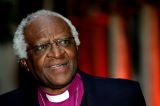Tutu, Desmond

Desmond Tutu (1931-2021) was born in 1931 in Klerksdorp, Transvaal, about 179 km west of Johannesburg into a Methodist family that later became Anglican. His parents were Xhosa and Tswana, and his father was a teacher. He attended school at Johannesburg Bantu High School. He trained first as a teacher at Pretoria Bantu Normal College and, in 1954, he graduated from the University of South Africa. He worked for three years as a high school teacher and then decided to study theology. He had wanted to pursue a medical career but could not afford the training.
In 1955, he married Nomalizo Leah Shenxane After his ordination as a priest in 1961, he pursued further theological study in England from 1962 to 1966, leading up to a Master of Theology. He taught theology in the Eastern Cape, South Africa from 1967 to 1972. At this time, he started to make his antiapartheid views known. He then returned to England for three years to become the assistant director of a theological institute in London. In 1975 he became the first Black Dean of St. Mary’s Cathedral in Johannesburg.
In 1985, at a time when townships were rising up in rebellions against the apartheid regime, Tutu was installed as the first Black Anglican bishop. He publicly endorsed civil disobedience and an economic boycott of South Africa to put an end to apartheid. A year later he was elected the first Black archbishop of Cape Town. With other church leaders, he mediated clashes between government forces and Black protesters. In 1988, he also became Chancellor of the University of Western Cape in Bellville, South Africa.
In 1990, President FW de Klerk unbanned the African National Congress (ANC) and announced the imminent release of Nelson Mandela from prison. Apartheid laws and racist restrictions were repealed the following year. 1994 saw the first democratic elections during which Mandela won by a landslide. At this time, Tutu coined the term “Rainbow nation” to describe the multiracial composition of post-apartheid South Africa.
Also in 1994, Mandela invited Tutu to head the Truth and Reconciliation Commission to investigate human rights violations under apartheid. In 1996, Tutu retired from his position as a primate and became archbishop emeritus, though continuing to work as a public figure. He pulled out of public life in 2010 but continued to advocate for conflict resolution with other world leaders in the group The Elders that he co-founded in 2007. In 2013 he criticized the ANC for its inaction in addressing questions of inequality, corruption, and violence. Through the Desmond & Leah Tutu Legacy Foundation (https://www.tutu.org.za/), he and his wife worked to promote peace-building and conflict resolution to achieve reconciliation and cultivate accountable servant leadership.
Tutu was not afraid to critique the church that he had served for decades. When there was an uproar over the ordination of gay bishops in the Anglican Church, he criticized an “obsession” with homosexuality that overshadowed the clergy’s battle on poverty. This did not stop him from declaring his support for gay rights in 2013.
On October 7, 2021 he attended a thanksgiving service in honor of his 90th birthday at St. George’s Cathedral in Cape Town, his former parish. He died on December 26, 2021 in Cape Town. According to Al Jazeera online:
His “clear views and fearless stance,” which made him a “unifying symbol for all African freedom fighters,” won him the Nobel Peace Prize in 1984, according to the Norwegian Nobel Institute. Though short in stature, Tutu was a giant of South African politics, notable for his drive, infectious laughter and witty critiques of apartheid’s absurdities. In one example, he told followers: “Be nice to whites, they need you to rediscover their humanity.” “He was South Africa’s Martin Luther King – a Christian clergyman who worked, non-violently, for racial justice and equality,” Steven Gish, author of a biography on Tutu, told Al Jazeera. “He never hated his oppressors and always believed in dialogue and appealing to people’s moral conscience.”
He received honorary doctorates from a number of leading universities in the USA, Britain, and Germany. According to Britannica online:
Tutu authored or coauthored numerous publications, including The Divine Intention (1982), a collection of his lectures; Hope and Suffering (1983), a collection of his sermons; No Future Without Forgiveness (1999), a memoir from his time as head of the Truth and Reconciliation Commission; God Has a Dream: A Vision of Hope for Our Time (2004), a collection of personal reflections; and Made for Goodness: And Why This Makes All the Difference (2010), reflections on his beliefs about human nature. In addition to the Nobel Prize, Tutu received numerous honours, including the U.S. Presidential Medal of Freedom (2009), an award from the Mo Ibrahim Foundation that recognized his lifelong commitment to “speaking truth to power” (2012), and the Templeton Prize (2013).
Michele Sigg
Bibliography:
Nobel Lectures, Peace 1981-1990, Editor-in-Charge Tore Frängsmyr, Editor Irwin Abrams, World Scientific Publishing Co., Singapore, 1997.
Al Jazeera online, December 26, 2021. https://www.aljazeera.com/news/2021/12/26/key-dates-in-the-life-ofsouth-african-cleric-desmond-tutu. Accessed January 17, 2022.
“Desmond Tutu profile.” The Elders website. https://theelders.org/profile/desmond-tutu. Accessed January 17, 2022.
“Desmond Tutu.” Britannica online, https://www.britannica.com/biography/Desmond-Tutu. Accessed January 17, 2022.
Michele Sigg is the executive director of the Dictionary of African Christian Biography.



